
International Journal of Agricultural Sustainability
Scope & Guideline
Fostering Interdisciplinary Solutions for Sustainable Agriculture
Introduction
Aims and Scopes
- Sustainability Assessment and Performance Metrics:
The journal emphasizes research related to assessing agricultural sustainability through various frameworks and indicators, helping to evaluate practices and policies aimed at improving sustainability in agriculture. - Innovative Agricultural Practices:
It covers studies on innovative practices such as conservation agriculture, agroecology, and organic farming, highlighting their role in increasing productivity while maintaining ecological balance. - Socio-Economic Factors in Agriculture:
Research on the socio-economic aspects of agricultural practices, including the role of gender, community engagement, and market access, is a core focus, providing insights into how these factors affect sustainability. - Climate Change and Resilience Strategies:
The journal addresses the impacts of climate change on agriculture, exploring adaptive strategies that farmers can implement to enhance resilience and sustainability of food systems. - Technological Innovations in Agriculture:
It discusses the integration of digital technologies and innovations in agricultural practices, assessing their effectiveness in improving sustainability outcomes. - Participatory Approaches and Community Engagement:
The journal values participatory research methodologies that involve local communities in the development and implementation of sustainable agricultural practices.
Trending and Emerging
- Digital Agriculture and Technology Adoption:
There is a growing focus on how digital tools and technologies can enhance agricultural practices, improve productivity, and facilitate sustainable intensification among smallholder farmers. - Climate-Smart Agriculture:
Research on climate-smart practices aimed at enhancing resilience to climate change is gaining traction, highlighting the need for adaptive strategies that mitigate environmental impacts. - Gender and Inclusivity in Agriculture:
Emerging themes around gender roles and inclusivity in agricultural practices are becoming more prominent, emphasizing the importance of considering diverse perspectives in sustainability research. - Agroecological Approaches:
There is an increasing interest in agroecology as a viable alternative to conventional agriculture, focusing on ecological principles to enhance sustainability and resilience. - Circular Economy in Agriculture:
Research exploring circular economy principles within agricultural systems is on the rise, focusing on waste reduction, resource efficiency, and sustainable practices that contribute to overall sustainability.
Declining or Waning
- Traditional Agricultural Practices:
There has been a noticeable decline in research focusing solely on traditional agricultural practices without integration into sustainability frameworks, as the field moves towards more innovative and adaptive approaches. - Single Crop Focus Studies:
Research concentrating on single crop systems is becoming less prominent, as the journal increasingly favors studies that explore complex, integrated farming systems that enhance sustainability. - Pesticide Use Studies:
Research solely focused on pesticide use, particularly conventional approaches, is declining in favor of studies that promote integrated pest management and sustainable alternatives.
Similar Journals
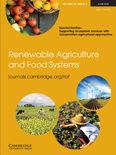
RENEWABLE AGRICULTURE AND FOOD SYSTEMS
Innovating solutions for global food security.RENEWABLE AGRICULTURE AND FOOD SYSTEMS, published by Cambridge University Press, is a leading open-access journal dedicated to the advancement of sustainability in agricultural practices and food systems. With an ISSN of 1742-1705 and an E-ISSN of 1742-1713, this journal spans the interdisciplinary fields of agronomy and food science, achieving a commendable Q2 ranking in both categories for 2023. As it continues to converge through the years from 2004 to 2024, the journal offers a platform for researchers, professionals, and students to disseminate transformative research that addresses the challenges of food security, resource management, and environmental impact. The journal’s significant impact is underscored by its Scopus rankings, situating it in the 77th percentile among agronomy and crop science publications, and the 67th percentile in food science. Since becoming fully open access in 2023, RENEWABLE AGRICULTURE AND FOOD SYSTEMS promotes wider accessibility to vital research findings, fostering collaboration and innovation in the pursuit of sustainable agricultural practices and food systems worldwide.
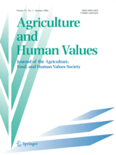
AGRICULTURE AND HUMAN VALUES
Connecting agriculture to the heart of human values.AGRICULTURE AND HUMAN VALUES is a leading interdisciplinary journal published by SPRINGER, focusing on the intricate relationships between agricultural practices, environmental sustainability, and human well-being. With an impressive impact factor and ranking in the Q1 quartile across various fields including Agronomy and Crop Science, Geography, Planning and Development, and Sociology and Political Science, this journal provides a vital platform for researchers and professionals to explore the social, economic, and cultural dimensions of agriculture. As a prominent outlet since its inception in 1984, it aims to contribute to the dialogue on sustainable practices and policies that impact food systems globally. The journal caters to a diverse readership, including scholars, policymakers, and students, ensuring that critical research findings reach those who can influence change. With a solid reputation and commitment to advancing knowledge in these essential areas, AGRICULTURE AND HUMAN VALUES remains an invaluable resource for those dedicated to improving agricultural practices and human health in a rapidly changing world.

Agronomy for Sustainable Development
Nurturing Innovation in Agronomy and Environmental StewardshipAgronomy for Sustainable Development, published by SPRINGER FRANCE, is a leading international journal dedicated to advancing the field of agronomy and sustainable practices. With its ISSN 1774-0746 and e-ISSN 1773-0155, this esteemed journal plays a pivotal role in disseminating cutting-edge research and innovative solutions that address critical challenges in agriculture and environmental engineering. Achieving remarkable rankings in Scopus—specifically, 19th out of 406 in Agronomy and Crop Science and 22nd out of 197 in Environmental Engineering—underscores its prestige, with a remarkable 95th and 89th percentile respectively. The journal is open access, promoting broader dissemination of knowledge, and welcomes contributions that foster sustainable agricultural practices and enhance environmental stewardship. As an essential resource for researchers, professionals, and students, Agronomy for Sustainable Development serves as a platform for interdisciplinary collaboration aimed at nurturing resilient agricultural systems and promoting sustainability worldwide.

Future of Food-Journal on Food Agriculture and Society
Empowering Voices in Food, Agriculture, and SocietyThe Future of Food-Journal on Food Agriculture and Society, published by Kassel University Press GmbH, serves as a vital platform for emerging research at the intersection of food, agriculture, and societal impacts. With an ISSN of 2197-411X and operating within the realms of Agronomy, Ecology, and Food Science, this journal is pivotal for researchers and professionals aiming to address contemporary challenges in the food sector. Although currently ranked in the fourth quartile across its scholarly categories (2023), the journal showcases a wealth of innovative studies, critical analyses, and global perspectives that strive to enhance our understanding of sustainable agriculture practices, food security, and environmental stewardship. The Open Access format encourages wide dissemination and engagement with research findings, making it an essential resource for students and academics alike. As the journal converges from 2013 to 2024, it aims to foster discussions that will shape the future of food systems worldwide.

AGROCIENCIA
Empowering research that cultivates environmental solutions.AGROCIENCIA, published by COLEGIO POSTGRADUADOS, is a key journal in the fields of agronomy, animal science, and environmental science in Mexico. With an ISSN of 1405-3195 and an E-ISSN of 2521-9766, this journal has been a crucial platform for disseminating research findings since its inception in 2000. Operating from Montecillo, Estado Mexico, it provides an outlet for scholars and practitioners to share innovations and insights that directly impact agricultural practices and environmental sustainability. Despite its current categorization in the Q4 quartile across multiple disciplines, AGROCIENCIA strives to elevate the quality and reach of research, fostering a collaborative approach to tackle pressing issues within the agricultural sciences. Access options are primarily through institutional subscriptions, allowing for a diverse audience of researchers, professionals, and students to engage with the latest studies aimed at advancing knowledge in the agricultural sector. As the journal converges towards its 2024 milestone, it remains dedicated to enhancing scientific inquiry and promoting effective solutions within its discipline.

NJAS-Impact in Agricultural and Life Sciences
Empowering the dialogue on life sciences and agricultural advancements.NJAS-Impact in Agricultural and Life Sciences is a pivotal open-access journal, published by Taylor & Francis Ltd, focusing on the interdisciplinary nexus between agricultural practices and life sciences. Anchored in the United Kingdom, this journal aims to provide a comprehensive platform for the dissemination of innovative research that addresses critical challenges in environmental sustainability, agricultural productivity, and biological advancements. With its inaugural issue dated from 2023 to 2024, NJAS prominently features the latest empirical studies, reviews, and theoretical contributions that enrich existing knowledge and provoke thought among researchers and practitioners alike. Although currently ranking within the lower percentiles across various Scopus categories, the journal aspires to establish itself as a significant contributor to the dialogue on agricultural and environmental sciences. As scholars in these fields seek to bridge the gaps in understanding, NJAS invites submission from diverse perspectives, underscoring the importance of collaborative knowledge-building in addressing the complexities of our changing global landscape.
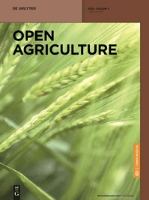
Open Agriculture
Cultivating Knowledge for a Sustainable FutureOpen Agriculture, published by DE GRUYTER POLAND SP Z O O, is an innovative open-access journal dedicated to advancing research in the Agricultural and Biological Sciences. Since its inception in 2016, this journal has been committed to disseminating knowledge and facilitating collaboration among researchers, professionals, and enthusiasts in the agricultural sector. With an impressive Q2 ranking in the Agricultural and Biological Sciences category, it holds a prestigious position, ranking #65 out of 221 in its field, placing it in the 70th percentile. Open Agriculture offers a platform for high-quality research across a diverse range of topics, ensuring that crucial findings are readily accessible to the global scientific community. The journal continues to uphold its mission of promoting sustainable agricultural practices and innovations that address contemporary challenges in food security and environmental sustainability. With its strong commitment to open access principles, researchers and students alike can easily engage with cutting-edge research and contribute to the vibrant discourse surrounding modern agriculture.
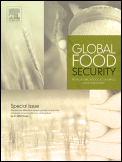
Global Food Security-Agriculture Policy Economics and Environment
Empowering researchers to reshape food security landscapes.Global Food Security - Agriculture Policy Economics and Environment is a leading interdisciplinary journal published by Elsevier that addresses critical issues in food security through the lens of agriculture, economics, and environmental sustainability. With an impressive impact factor and a distinguished placement in the Q1 quartile across multiple categories including Ecology, Food Science, and Safety Research for 2023, this journal is a vital resource for researchers and practitioners aiming to address modern challenges in global food systems. Covering essential topics from agricultural policy to ecological implications, the journal provides a platform for innovative research and policy discussions that foster the advancement of food security on a global scale. Notably, it is indexed in Scopus, where it ranks in the top percentiles across its relevant categories, reflecting its significance in the field. The journal is accessible to a wide audience, making it an indispensable source of knowledge for professionals and students aiming to tackle the complex interplay between food production and environmental stewardship.

Smart Agricultural Technology
Revolutionizing Farming with Cutting-Edge SolutionsSmart Agricultural Technology, an esteemed journal published by ELSEVIER, stands at the forefront of agricultural innovation, with its focus on the intersection of cutting-edge technology and sustainable farming practices. Established in 2021, this Open Access journal is committed to disseminating pivotal research findings in the fields of Agricultural and Biological Sciences, Artificial Intelligence, and Computer Science, ensuring that crucial developments are accessible to all stakeholders. With a notable impact factor denoted by its impressive Q1 and Q2 categorizations, Smart Agricultural Technology ranks among the top journals in its fields, boasting a percentile standing of 76th in Agricultural and Biological Sciences and 68th in Computer Science advancements. Operating out of the Netherlands, the journal offers a dynamic platform for researchers, professionals, and students to explore, share, and drive forward the agenda of smart agriculture through vital interdisciplinary collaboration and knowledge dissemination. Featured in Scopus, it promises not only rigor and excellence but also a vibrant forum for groundbreaking ideas and practices that can transform the agricultural landscape.
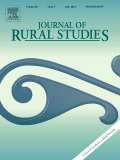
Journal of Rural Studies
Exploring the Dynamics of Rural LifeWelcome to the Journal of Rural Studies, a premier peer-reviewed publication dedicated to advancing the field of rural research. Published by PERGAMON-ELSEVIER SCIENCE LTD, this esteemed journal has been a cornerstone of scholarly discourse since its inception in 1985 and continues to evolve through 2024. With an impressive impact factor and categorization in the Q1 tier across various fields, including Development, Forestry, Geography, Planning and Development, and Sociology and Political Science, the journal is among the elite voices in rural studies. Researchers, professionals, and students alike will find invaluable insights within its pages, supported by rigorous empirical research and theoretical explorations that address the complexities of rural life and its myriad challenges. While it currently does not offer open access, the subscription model ensures a broad dissemination of knowledge, fostering collaboration and innovation within the academic community. With a robust Scopus ranking that places it in the top percentiles across multiple social sciences, the Journal of Rural Studies remains an essential resource for those dedicated to understanding and improving rural environments worldwide.